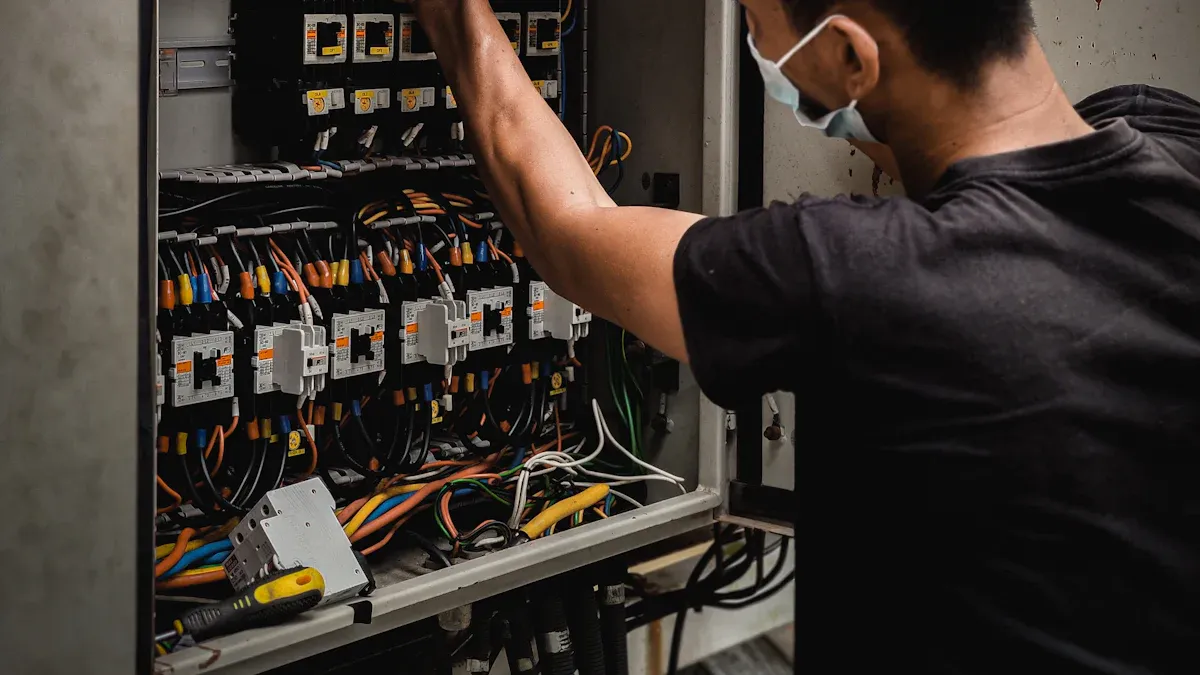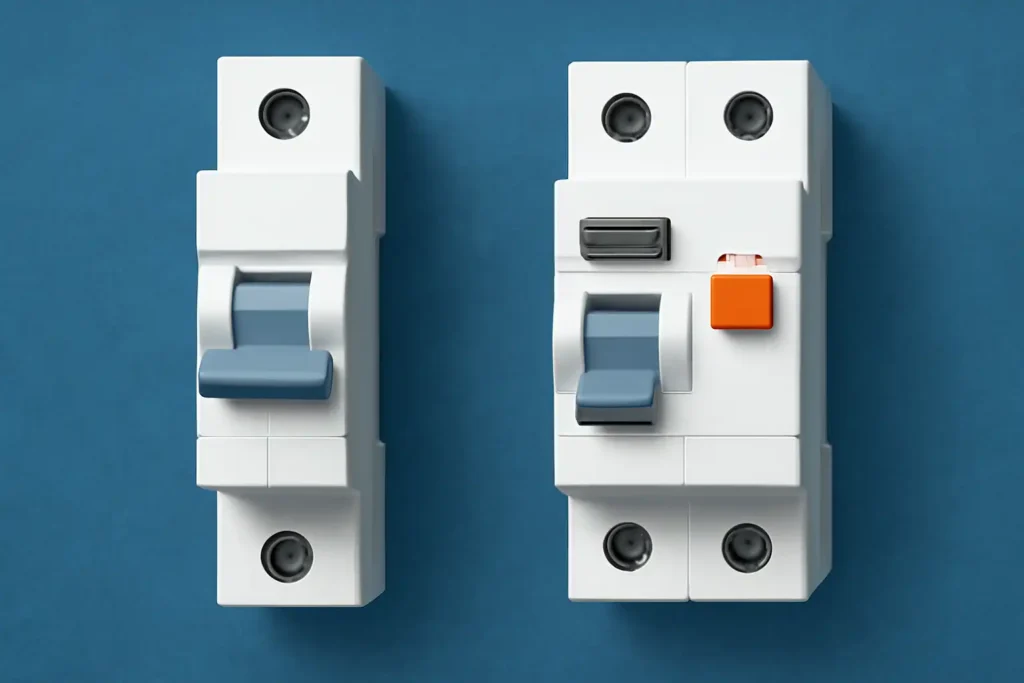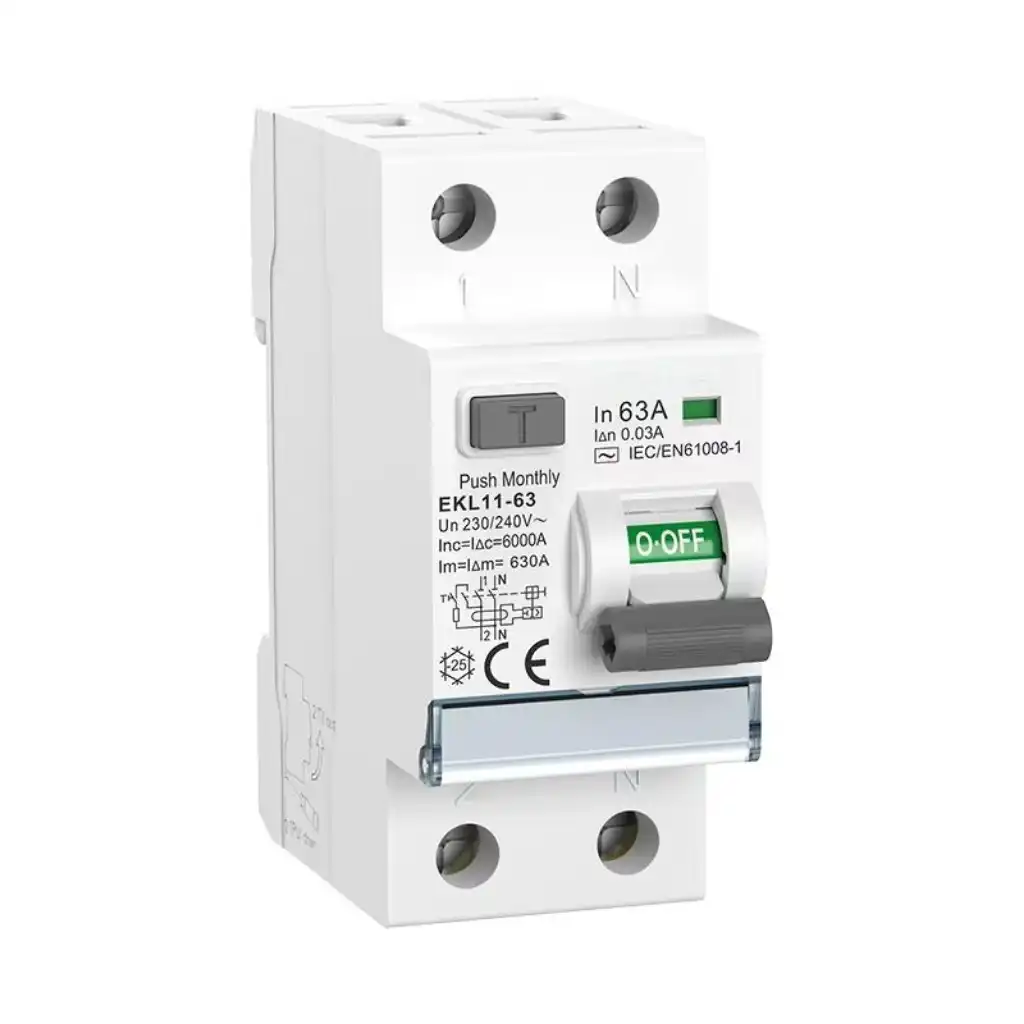If you want to make your home safer, consider an upgrade where RCBO replaces MCB in most situations. RCBOs not only protect against overcurrent but also guard against earth faults, offering greater safety than a standard MCB. With RCBO replacing MCB, you can have peace of mind knowing your devices and wiring are better protected.
When RCBO replaces MCB, it helps prevent electrical accidents and keeps your family safe.
Key Takeaways
- RCBOs keep your home safe from too much power, short circuits, and earth faults. They are safer than MCBs.
- Put RCBOs in places like kitchens, bathrooms, and outside outlets. This helps lower the chance of electric shock and fire.
- Look at your consumer unit to see if there is space and if it works with RCBOs. Always get a licensed electrician to put them in.
- RCBOs work with most new panels and follow new safety rules. They cost more than MCBs.
- Getting RCBOs helps you feel safe. They protect your family and home from electrical dangers.
RCBO Replaces MCB: The Basics

What is an MCB?
You may have seen a small switch in your home’s electrical panel. This device is called a Miniature Circuit Breaker, or MCB. An MCB protects your home from electrical problems like short circuits and overloads. When too much current flows through a circuit, the MCB trips and cuts off the power. This action helps stop wires from overheating and prevents fires.
MCBs are simple to use. You can reset them by flipping the switch back on after fixing the problem. Many homes use MCBs because they are reliable and easy to install. However, MCBs only protect against too much current. They do not detect other dangers, such as earth faults, which can happen if electricity escapes from a wire and travels to the ground.
Tip: If you notice your MCB trips often, you should check your appliances or call an electrician. Frequent tripping means something is wrong.
What is an RCBO?
An RCBO, or Residual Current Circuit Breaker with Overcurrent protection, takes safety a step further. When RCBO replaces MCB, you get two types of protection in one device. An RCBO not only guards against overloads and short circuits, but it also detects earth faults. This means it can sense when electricity leaks from a circuit, which helps prevent electric shocks.
You can use RCBOs on important circuits, such as those in kitchens, bathrooms, or outdoor areas. These places have a higher risk of electrical accidents. RCBOs trip quickly when they sense danger, so you and your family stay safe.
- MCB: Protects against overloads and short circuits.
- RCBO: Protects against overloads, short circuits, and earth faults.
Choosing RCBOs gives you more complete protection for your home.
Key Differences
Protection Features
You need to know how protection features differ when RCBO replaces MCB. An MCB only protects your home from two dangers: overloads and short circuits. If you plug in too many devices or if a wire touches another wire, the MCB trips and stops the flow of electricity. This action keeps your wires from overheating.
An RCBO gives you more. It protects against overloads and short circuits, but it also detects earth faults. An earth fault happens when electricity escapes from a wire and tries to reach the ground. This can cause electric shocks. The RCBO trips quickly if it senses this problem. You get two layers of safety in one device.
Note: If you want the best protection for each circuit in your home, choose RCBOs. They combine the work of an MCB and an RCD (Residual Current Device).
Here is a quick comparison:
| Feature | MCB | RCBO |
|---|---|---|
| Overload Protection | ✅ | ✅ |
| Short Circuit Protection | ✅ | ✅ |
| Earth Fault Protection | ❌ | ✅ |
Safety Benefits
When you look at safety, RCBOs stand out. You get extra protection from electric shocks. This is important in places like kitchens, bathrooms, and outdoor areas. Water and electricity do not mix well. If an earth fault happens, the RCBO trips fast and keeps you safe.
You also lower the risk of fire. MCBs stop fires from overloads, but they miss earth faults. RCBOs catch both. You protect your family and your property.
Tip: If you want to upgrade your home’s safety, ask your electrician if RCBO replaces MCB in your consumer unit.
Cost and Space
You might wonder about the cost and space needed for these devices. MCBs cost less than RCBOs. If you have a tight budget, you may want to keep MCBs. However, RCBOs give you more protection, so you get better value for your money in the long run.
RCBOs take up about the same space as MCBs in most modern consumer units. You do not need a lot of extra room. In older panels, you should check if there is enough space before you switch. Some older units may not fit RCBOs.
- MCB: Lower cost, basic protection, fits most panels.
- RCBO: Higher cost, full protection, fits most modern panels.
Alert: Always check your consumer unit before you buy new devices. Ask a professional if you are not sure about space or compatibility.
When to Replace
High-Risk Areas
You should think about upgrading when you have high-risk circuits in your home. Kitchens, bathrooms, and outdoor outlets face more danger from water and moisture. These places need extra protection. If you use power tools outside or have a pool, you face a higher risk of electric shock. When RCBO replaces MCB in these areas, you get better safety. Each circuit gets its own protection, so one problem does not shut down your whole house.
Tip: Ask your electrician to check which circuits need the most protection. You can start with the riskiest spots.
Regulatory Needs
Rules for home electrical safety change over time. Many new homes must use RCBOs to meet the latest codes. If you plan to remodel or sell your house, you may need to upgrade. Some insurance companies also want you to use RCBOs for better coverage. Always check local rules before you make changes. You stay safer and avoid problems with inspections when you follow the latest standards.
- New builds often require RCBOs.
- Renovations may trigger new safety rules.
- Insurance policies might ask for extra protection.
Compatibility Checks
Before you replace anything, check your consumer unit. Older panels may not fit RCBOs. You need to look at the size of the cables and make sure the isolation times match safety standards. If you do not know how to check these things, call a licensed electrician. They can tell you if your system can handle the upgrade. Professional advice helps you avoid mistakes and keeps your home safe.
Alert: Never try to swap devices on your own if you are not sure about compatibility. You could damage your system or break safety rules.
Pros and Cons
MCB Pros and Cons
Many homes still use MCBs for good reasons.
- Affordable: MCBs cost less, so you save money.
- Simple Operation: You can reset them with a quick flip.
- Reliable: They stop overloads and short circuits well.
- Compact Size: MCBs fit easily in most consumer units.
But MCBs have some problems too.
- Limited Protection: MCBs cannot find earth faults.
- Less Safety in Wet Areas: Kitchens and bathrooms need more safety.
- No Shock Prevention: MCBs do not stop electric shocks.
Note: If you want basic safety and need to save money, MCBs might be enough. For more safety, look at other choices.
| Pros | Cons |
|---|---|
| Low cost | No earth fault protection |
| Easy to reset | Not ideal for wet areas |
| Reliable for basics | No shock prevention |
RCBO Pros and Cons
When RCBO replaces MCB, you get extra safety. RCBOs protect against overloads, short circuits, and earth faults. You lower the chance of electric shock in risky places.
- Comprehensive Protection: RCBOs guard against overcurrent and earth faults.
- Safer for Families: RCBOs trip fast to stop shocks.
- Meets Modern Standards: New homes often need RCBOs.
- Fits Most Modern Panels: RCBOs work in most new consumer units.
RCBOs also have some downsides.
- Higher Cost: RCBOs cost more than MCBs.
- Compatibility Issues: Old panels may not fit RCBOs.
- Complexity: You might need an electrician to install them.
Tip: For the best safety, use RCBOs in risky circuits and new homes.
| Pros | Cons |
|---|---|
| Full protection | Higher price |
| Safer for wet areas | May not fit old panels |
| Meets regulations | Needs professional advice |
Practical Tips
Choosing the Right Device
You want to make sure you pick the best device for your home. Start by thinking about which circuits need the most protection. Circuits in kitchens, bathrooms, and outdoor areas face more risks. If you want the highest level of safety, choose RCBOs for these places. When RCBO replaces MCB, you get both overcurrent and earth fault protection on each circuit.
Make a list of your circuits and note which ones power important or high-risk areas. You can use a table like this to help you decide:
| Circuit Location | Risk Level | Recommended Device |
|---|---|---|
| Kitchen | High | RCBO |
| Bathroom | High | RCBO |
| Living Room | Medium | MCB or RCBO |
| Outdoor Outlet | High | RCBO |
Tip: Always check the label on your consumer unit to see what devices you already have.
Installation Advice
Before you start any work, talk to a licensed electrician. They know how to check your consumer unit for space and compatibility. Most of the time, swapping MCBs for RCBOs does not need to be reported unless you make big changes to your wiring. Still, you should always follow local rules.
Check if your consumer unit has enough room for new devices. Some older units may not fit RCBOs. Your electrician can measure the space and look at the cable sizes. They will also test the isolation times to make sure everything meets safety standards.
Alert: Never try to replace these devices on your own if you are not sure what to do. Electrical work can be dangerous.
If you plan ahead and get expert advice, you can upgrade your home safely and easily.
When you want the best protection for your home, RCBO replaces MCB as the smarter choice. You get safety from both overcurrent and earth faults. Always ask a licensed electrician before you upgrade. Make sure your consumer unit fits the new devices and meets local rules. If you have high-risk areas or plan to remodel, choose RCBOs for peace of mind. Put safety first and talk to an expert before you make changes.
FAQ
What is the main reason to choose an RCBO over an MCB?
You get better safety with an RCBO. It protects you from both overcurrent and earth faults. This means you lower the risk of electric shock and fire in your home.
Can you replace an MCB with an RCBO yourself?
You should not try this on your own. Always hire a licensed electrician. Electrical work can be dangerous if you do not have the right skills or tools.
Do RCBOs fit in all consumer units?
RCBOs fit in most modern consumer units. Some older panels may not have enough space. Ask your electrician to check your unit before you buy new devices.
Are RCBOs required by law in every home?
Not every home needs RCBOs by law. New homes and major remodels often require them. Local codes and insurance rules may also ask for RCBOs. Always check your area’s requirements.
Will installing RCBOs increase your electricity bill?
No, RCBOs do not use extra power. They only protect your circuits. Your electricity bill will not go up after you install them.
See also
Understanding RCBO Breaker Terminology Made Simple
RCBO residual current circuit breaker with overcurrent protection
Key Differences Between RCD, MCB, and ROCO Devices
RCBO and RCCB Explained for Beginners
Electronic RCBO with overcurrent protection




